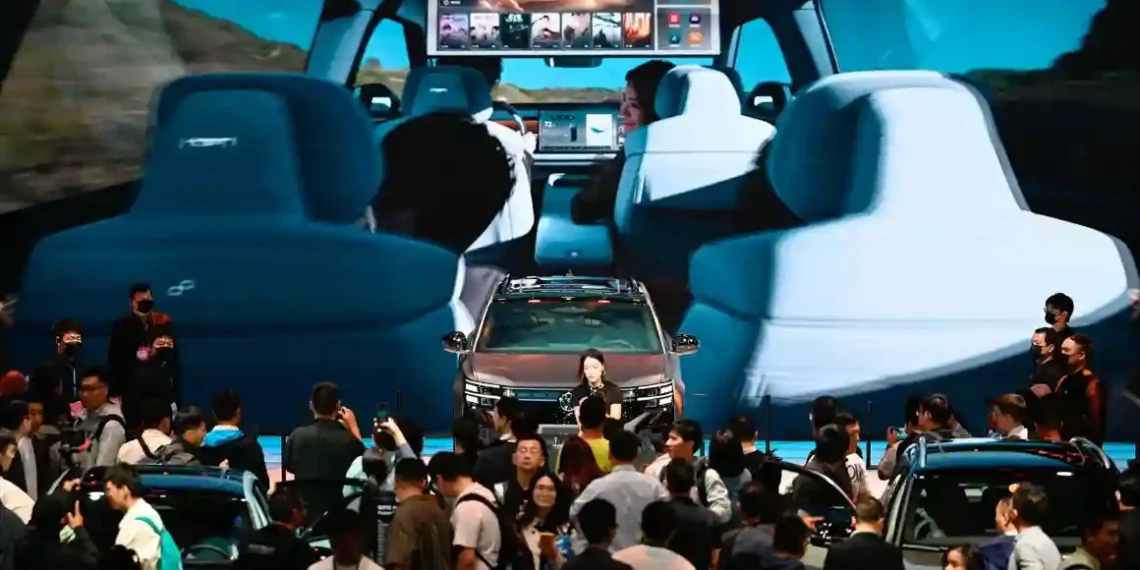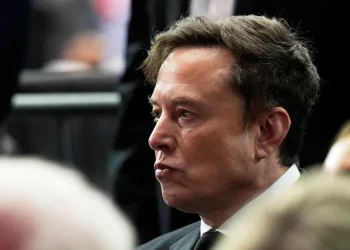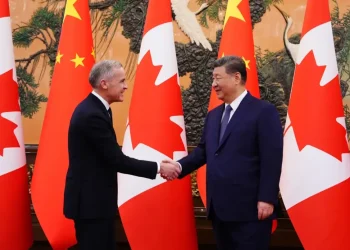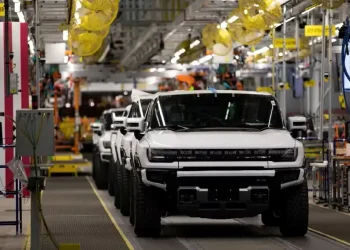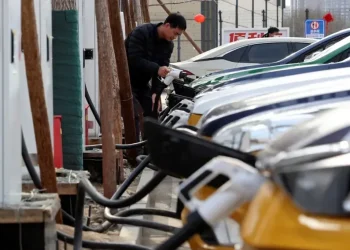China’s Electric Vehicle Industry: A Game-Changer for the Global Auto Market
At this year’s Shanghai Auto Show, the message was clear: China is leading the charge in electric vehicle (EV) innovation, and it’s ready to take on the world. The massive exhibition, spanning over 60 football fields of floor space, showcased the country’s rapid rise in automotive technology, with carmakers unveiling cutting-edge models and features.
From electric batteries that charge in just five minutes, to futuristic flying cars and highly advanced assisted driving technology, the event was a high-energy spectacle that captivated both crowds and live-streaming audiences. But this year, unlike previous shows dominated by legacy brands like GM, Volkswagen, and BMW, the spotlight belonged to China’s EV innovators.
One of the most talked-about moments at the show was the unveiling of the Denza Z, an electric sports car from BYD, China’s largest carmaker. Known for its “extreme performance” and “pure emotional design,” the Denza Z drew applause from the crowd, a testament to how far Chinese automakers have come. The excitement was palpable, with attendees cheering and shouting “We love you” in support of the cutting-edge EV.
Meanwhile, in another part of the exhibition, tech giant Xiaomi, traditionally known for smartphones and electronics, showcased its EV offerings. Nio, another Chinese powerhouse, revealed its luxurious ET9 sedan, which rivals top-tier European models like the BMW 7-Series and Porsche Panamera.
These reveals underscore a shift in the global automotive landscape. China, once seen as a producer of low-cost knock-offs, is now at the forefront of the rapidly expanding global EV market. And the world is taking notice.
The rise of China’s EV industry is especially significant given the ongoing U.S.-China trade war. President Trump’s tariffs on imported vehicles have created uncertainty for American automakers. However, Chinese EV makers are relatively insulated from this because they have already shifted their focus to international markets beyond the U.S. After all, China controls more than 60% of the global EV market, according to energy analytics firm Rho Motion.
While the U.S. pushes for a revival of its auto industry, China’s EV sector is gaining a significant competitive edge. With foreign automakers like Tesla, General Motors, and Volkswagen grappling with tariffs and trade restrictions, China’s electric carmakers are positioning themselves as global players.
The competition among Chinese EV makers is intense, driving rapid innovation. Just last month, BYD released a battery that could charge its cars in five minutes, providing 250 miles of range. But the company was quickly upstaged by Chinese battery giant CATL, which revealed a new battery capable of delivering 320 miles in the same time.
Tech firms like Huawei and Momenta are also pushing forward with advancements in intelligent driving technology, while BYD is adding more features to its cars, including its “God’s Eye” driver-assistance system at no extra charge. The speed at which China is innovating has taken even foreign companies by surprise.
As one industry veteran remarked, “We came back after the country reopened, and we immediately realized: Wow, China has changed so much.” This rapid pace of development is transforming the automotive landscape, with Chinese automakers now leading the charge in both technology and value for money.
Chinese consumers have become increasingly discerning, seeking out vehicles that offer not only cutting-edge technology but also affordability. The Shanghai Auto Show demonstrated this perfectly. Carmakers showcased cars equipped with luxurious features like heated seats, massage functions, and advanced entertainment systems—at a fraction of the cost of their foreign counterparts.
One American businessman attending the show was shocked to find a car with a moonroof, voice control, and ample legroom for just $20,000. “We were expecting a much higher price,” he said, highlighting the value Chinese automakers offer compared to their Western counterparts.
Despite the fierce competition, Chinese EV makers are not deterred. Many are looking to expand into global markets, with Chinese exports growing steadily. In the first quarter of this year, Chinese manufacturers exported 441,000 EVs, including hybrids—up more than 40% from the same period last year.
Foreign automakers, such as Volkswagen, are also recognizing China’s dominance in the EV sector. Volkswagen’s CEO, Ralf Brandstätter, emphasized the company’s “in China, for China” approach, ramping up its EV efforts and forging partnerships with Chinese tech firms to stay competitive in the market.
China’s automotive transformation has been nothing short of remarkable. Just two decades ago, China had little to no car culture. The country was known as the “kingdom of bicycles.” However, with rapid economic growth and the rise of a middle class, China became a key player in the global auto market. Today, half of all cars sold in China are electric or hybrid models, a far cry from just a few years ago.
This shift has been driven by a combination of government support, private investment, and visionary entrepreneurs like Wang Chuanfu, the founder of BYD. Since its early days in the 1990s, BYD has become a global force in the EV market, surpassing Tesla in 2024 to become the world’s largest EV maker in terms of sales.
China’s dominance in the EV sector is reshaping the global automotive industry. For the U.S. and other Western nations, this shift represents both a challenge and an opportunity. As Chinese automakers continue to innovate and expand their reach, foreign brands are scrambling to catch up. Partnerships with Chinese firms are becoming increasingly common, as companies look to tap into China’s growing tech and EV expertise.
But the ongoing trade tensions between the U.S. and China could make the future uncertain. As tariffs continue to increase, Chinese automakers may face additional hurdles when trying to enter Western markets. However, their ability to innovate rapidly and deliver high-quality, affordable vehicles positions them to thrive in an increasingly electric world.
The rise of China’s EV industry is not just a passing trend. It’s a seismic shift in the global automotive market, one that promises to reshape the way the world thinks about electric vehicles. With China’s focus on affordability, technological advancements, and global expansion, its EV sector is poised to dominate the future of transportation.
As China continues to lead the charge in the EV revolution, the question remains: Is the rest of the world ready to keep up?
This article was rewritten by JournosNews.com based on verified reporting from trusted sources. The content has been independently reviewed, fact-checked, and edited for accuracy, neutrality, tone, and global readability in accordance with Google News and AdSense standards.
All opinions, quotes, or statements from contributors, experts, or sourced organizations do not necessarily reflect the views of JournosNews.com. JournosNews.com maintains full editorial independence from any external funders, sponsors, or organizations.
Stay informed with JournosNews.com — your trusted source for verified global reporting and in-depth analysis. Follow us on Google News, BlueSky, and X for real-time updates.
